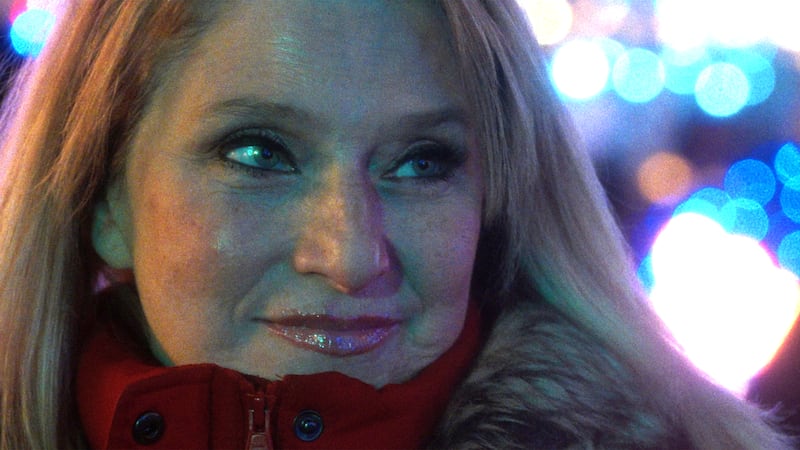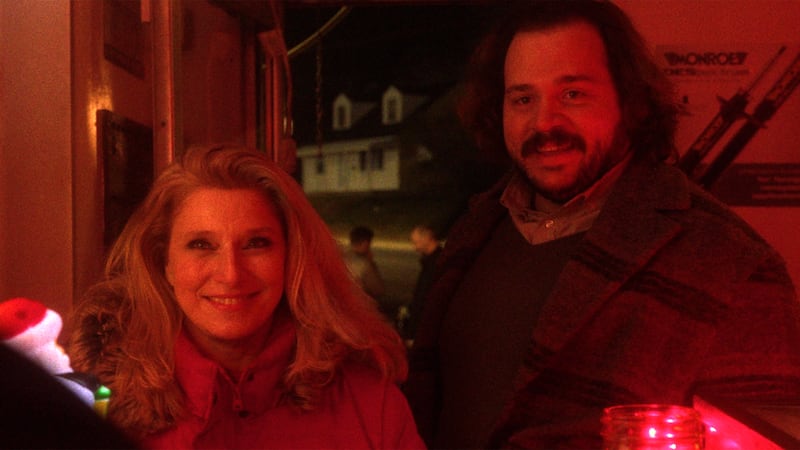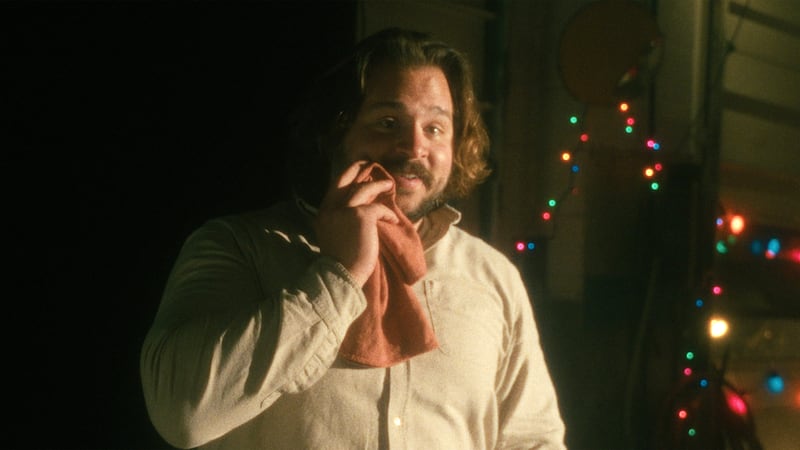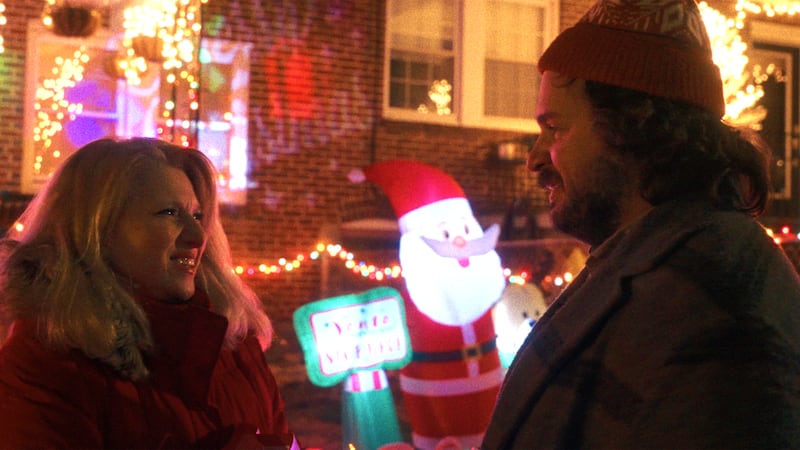Despite sounding like an insult, The Baltimorons’ title is actually an affectionate term for the unique weirdos that populate Maryland’s most famous city.
Jay Duplass’ film, in theaters Sept. 5, is a warm and compassionate ode to two such individuals who cross paths on Christmas Eve. Imparting an evocative, lived-in sense of its East Coast milieu, this funny and charming slice-of-life tale has the spirit of a low-fi ’70s romantic comedy, complete with characters who resonate as authentic inhabitants of their particular time and place.
Set over an eventful 24 hours, it’s a throwback that’s apt to become, at least in some Charm City homes, a Yuletide staple.
The season is off to a good start for Cliff (Michael Strassner), who impresses his fiancé Brittany (Olivia Luccardi) by showing off the chip that indicates he’s been sober for six months. Things don’t stay cheery for long, however, since on his way into Brittany’s mother’s house for Christmas Eve festivities, he walks into the door jamb and damages his tooth.

Following numerous failed calls, he finally reaches a dentist who’ll see him on the holiday. Upon arriving at the office, he’s greeted grumpily by Didi (Liz Larsen), whose workaholic nature has motivated her to begrudgingly tend to Cliff. For her efforts, she’s treated to lots of man-baby behavior, with Cliff tossing his coat in the corner (so Didi can pick it up and hang it on the hook) and whining about the Novocain shot that’s required to treat his injury.
To cope with this nonsense, Didi gasses Cliff with nitrous, and during his stupor, he overhears Didi on the phone with her daughter Shelby (Jessie Cohen), who reveals that Didi’s ex-husband Conway (Brian Mendes) has gotten remarried that morning to Patty (Mary Catherine Garrison), and is throwing an engagement party that evening—thus screwing Didi out of time with Shelby and granddaughter Maddie (Zoe Strassner).

This means Didi has no plans for the immediate future. That proves to be a curse and a blessing for the single woman, who subsequently agrees to drive Cliff to the impound lot because his cream-colored Cadillac has been towed during the appointment. She then watches in shock and horror as he attempts, very clumsily, to steal the car from the facility—a mission that’s complicated by the reappearance of the attendant, requiring Didi to provide surveillance support to keep him from being caught.
With a scruffy beard and a red wool hat covering his long-ish hair, Cliff resembles a slightly stockier Peter Sarsgaard, although his inappropriateness is all his own, as when he remarks—under the influence of dentist-administered drugs—that Didi smells very nice.

On their drive to find his vehicle, Cliff indulges in clownishness involving an ornate cat mural on a brownstone house (which is real!) and a dish of sweet potatoes with candy pecans that he tries to feed Didi by making chug-a-chug-a-choo-choo train noises. He additionally has a habit of trying, with little success, to guess people’s names, all of which confirms Didi’s initial impression of him as an immature buffoon.
Still, she confesses that he’s funny, and after getting him out of two morning jams, she accepts his invitation to dinner in Hamden, where the bright decorative lights and bustling atmosphere contribute to her growing fondness for the much-younger guy, who soon transforms from a grateful stranger to a potential suitor.
Aerial shots of Cliff and Didi’s car traversing roads with the city skyline in the background help give the film a legitimate Baltimore look and feel, and that genuineness extends to Conway and Patty, whose loud, strident unpleasantness is epitomized by their big-time Ravens fanaticism.
The Baltimorons knows whereof it speaks and has good-natured fun leaning into stereotypes, most notably during Cliff and Didi’s attendance at an improv show where Cliff is persona non grata thanks to a prior incident that got him banished from the scene—a crushing turn of events, it turns out, since comedy was his passion.
At the performance, Cliff is called back on stage to resurrect his signature “Baltimorons” bit, and with Didi roped into the absurdity, he affects the thickest of Bawlmore accents as a form of playful self-mockery—and, in the process, ignites actual sparks with Didi, much to her surprise.

Cliff and Didi are a May-December couple who shouldn’t work. Yet regardless of their differing circumstances, both are lonely, discontent people who learn, during their rambling odyssey, to embrace Cliff’s improv mantra “Yes, and..”—a principle which demands that artists validate each other and go with their partner’s flow.
The Baltimorons is a sweet story about seizing opportunities for joy no matter how ridiculous they seem, and if its happily ever after isn’t a surprise, it doesn’t play as contrived, thanks in large part to its leads. Mismatched in most regards save for the important ones—their kindness, their inner pain, and their longing for supportive companionship—Strassner’s Cliff and Larsen’s Didi are an endearing couple, and the longer they’re together, the more they bring out the best in each other.

Through a mixture of gregariousness, bravery, selflessness, and empathy, the two empower each other to see themselves and their circumstances for what they truly are—and, in doing so, to right their wayward courses.
Cliff and Didi’s serendipitous amour proceeds according to familiar rom-com conventions but its hopefulness comes from the film’s sincere belief that love is about more than just appearances, obligations, and expectations.
Personal growth leads to interpersonal harmony in The Baltimorons, and Duplass’ understated direction allows his protagonists’ chemistry to carry the material from start to finish; even when Cliff is less funny than he thinks he is (or wants to be), Strassner evokes his fundamentally good (if wounded) soul, and a great Larsen embodies Didi as a woman who’s rightfully cautious about lowering her guard and yet courageous enough to take a risk for herself and her future.
The Baltimorons’ comedy is occasionally a tad too subdued to crescendo. Nonetheless, the film is heartfelt and honest, and Strassner and Larsen are so good as unlikely paramours that they invariably bring a smile to one’s face. Thirteen years after his last behind-the-camera effort, Duplass guides his latest with a sure hand, proving that he still has a knack for modest, easygoing melodrama sprinkled with silliness.
The post ‘The Baltimorons’ Is the Year’s Most Charming Romantic Comedy appeared first on The Daily Beast.




